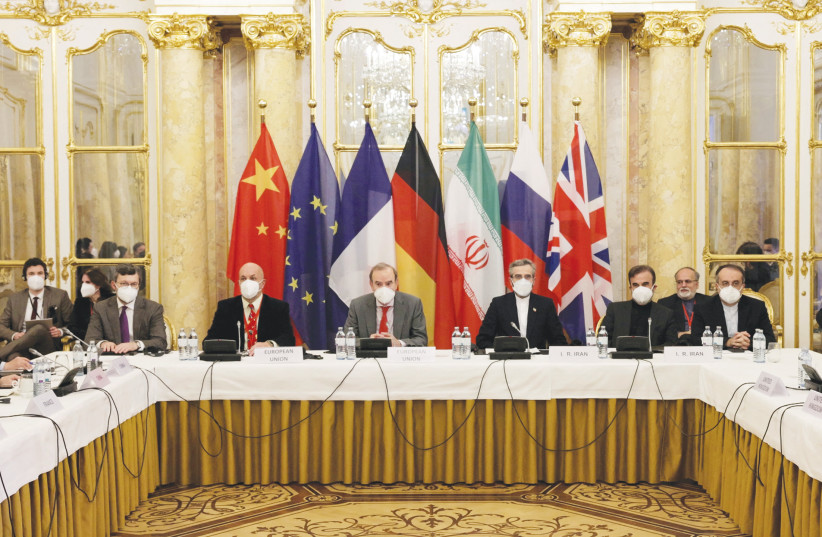Foreign Minister Yair Lapid is lobbying US administration against de-classifying Iran’s Islamic Revolutionary Guard Corps as a terrorist organization.

Talk about lowering the bar.
On what appears to be the eve of Washington entering into a new nuclear deal with Iran, Foreign Minister Yair Lapid urged organizational leaders of the American Jewish community on Monday to lobby the US administration not against entering into what according to all reports seems to be a shorter and weaker deal, but rather against de-classifying Iran’s Islamic Revolutionary Guard Corps as a terrorist organization.
The IRGC is the “roof organization of Hezbollah, Islamic Jihad, the Houthis in Yemen and a terrorist organization per se. We are talking to them [the US administration] about this and I think everybody in their right mind should talk to the administration about them and tell them this is just wrong – don’t do this,” he told the Conference of Presidents of Major American Jewish Organizations meeting in Jerusalem.
In other words, as the Biden administration is about to sign on to something that Israel believes is a clear and present danger, the Israeli government has gone from screaming bloody murder against it from every rooftop and platform – à la former prime minister Benjamin Netanyahu – to urging the US not to remove sanctions from the Iranian organization spreading bedlam throughout the Middle East.
Lapid brought up the IRGC issue in the context of the dialogue that Israel was having with the US about Iran, contrasting that with the lack of dialogue – and even animosity – that existed when Netanyahu was leading the charge against the Iranian deal, known as the Joint Comprehensive Plan of Action, in 2015.

“They [the Obama administration] did the JCPOA, and they ignored the fact that Israel was so much against it,” Lapid said. “And we almost lost the bipartisan status of Israel in Washington, which we cannot afford.”
Netanyahu fought the JCPOA tooth and nail, lost the fight, and in the process badly damaged Israel’s bipartisan support in Washington – at least in Lapid’s telling.
Fast forward seven years, and there is a new government in Israel whose representatives maintain that they have learned the lessons of the past: They will not fight the US in public against an Iranian nuclear deal so as not to jeopardize critical bipartisan support.
And, indeed, they have not fought the US in public even as the Biden administration has made it clear it is keen on entering a new deal. Prime Minister Naftali Bennett and Lapid have made various public comments – here and there – about the danger of the emerging new deal, but to say they have waged any kind of public campaign against it would be a gross overstatement. As a result, according to Lapid, Israel’s bipartisan support on Capitol Hill has been restored.
The current government, according to its spokesmen, is not working against the Americans on Iran, as Netanyahu did, but rather with them to impact it.
Except that this does not seem to have worked either, and the deal that appears to be emerging from Vienna looks like something that will have Iran on an open track to nuclear capabilities within a few short years.
Netanyahu’s in-your-face opposition did not work in preventing the Americans from entering a deal – though it surely had something to do with Donald Trump leaving the deal three years later. And Bennett and Lapid’s lets-work-quietly-together -behind-closed-doors approach does not seem to have worked either. So if neither approach works, there are key lessons to be learned.
The first is rather sobering: What Israel has to say on this issue does not matter all that much.
Israel and the US, though close friends, are different countries with different interests. At the end of the day, Washington is going to do what it thinks is in the best interest of America, even if that may severely complicate matters for Israel.
And currently, with Ukraine about to explode, with the rivalry with China only getting more intense, and with the US economy not at its healthiest, Washington believes its interest is to shove the Iranian issue to the side and concentrate on other issues – regardless of what Israel says, or – even more importantly – how it says it.
Israel can express its opposition politely, as the Bennett-Lapid team has done, or express it rudely, as Netanyahu did, but at the end of the day, it really does not matter. Israel is a small country a long way away from America and its ability to impact US policy on matters that the US believes touch on its national interests is limited.
This is a humbling lesson to be learned from both Jerusalem’s failure to keep the US from entering the deal in 2015, and its apparent failure to keep the US from reentering the deal today.
The second lesson is that when push comes to shove, Israel will, as it has in the past, need to act on its own – no one else is going to do its work for it. While a nuclear Iran poses a threat to the US, and the world, they do not view that threat as real or as immediate as Israel – their eagerness in re entering a badly flawed deal is proof of that.
Both Bennett and Lapid have said over the last three days that Israel reserves the right to take action, even if a deal is signed. Obviously, taking action against Iran – overt or covert – will be much more difficult after the US has reentered a deal.
More difficult, but not impossible if Israel genuinely believes that the deal paves the path for an Iranian nuclear bomb – something that Jerusalem views as an existential threat.
Israel has shown in the past that when it feels its back is against the wall, and it has no other choice, it will act – even against America’s express wishes.
It showed this in 1948, when it declared independence, despite State Department demands that it not do so.
It showed this in 1963, when it rebuffed John F. Kennedy’s demands that US inspectors be given access to the nuclear reactor in Dimona.
And it did so again in 1967, when it took preemptive action against the Egyptians, even though Lyndon Johnson wrote on June 3, 1967, to then-prime minister Levi Eshkol what he told Israel’s ambassador to Washington Abba Eban earlier: “I must emphasize the necessity for Israel not to make itself responsible for the initiation of hostilities. Israel will not be alone unless it decides to go alone. We cannot imagine that it will make this decision.”
Yet Israel made that decision because it felt it had no other choice.
Whether it takes action against Iran after a deal is signed, and what kind of action it takes, will be a true indication of how existential a threat it truly believes an Iran with a path to nuclear capability genuinely is, and whether it feels that now – as at other critical moments in its past – it really has no other choice.
Content retrieved from: https://www.jpost.com/middle-east/iran-news/article-698283.